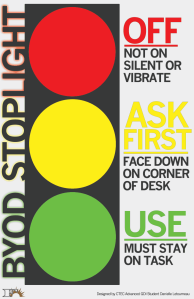
Image by Dean Moriarty from Pixabay
The Great EdTech Debate #5: Cellphones Should Be Banned in the Classroom
Going into this debate, it was the first time I didn’t really know what side of the argument I fell on. Since I teach Grade 1, cellphones have never been an issue in my classroom. I have heard my colleagues, who teach in the more senior grades, talk about the issues cellphones have caused in their classrooms throughout the years, but had not witnessed any problems for myself.
Because of this, I didn’t feel like I really had a strong pull to either side. For that reason, I chose to go with “Agree,” just because I had heard so many negatives, and less positives, when it came to allowing cellphones in the classroom.
Team Agree: Cellphones SHOULD Be Banned in the Classroom
Jill and Tarina took on the task of arguing for the posed debate question. In their video, shown below, they presented the top 4 reasons why they believed that cellphones should be ban from classrooms:
- Cellphones are Distracting
- School Devices are Safer
- Cellphones Increase Negative Behaviours
- Detachment from Personal Device
Jill and Tarina further proved their point with the video, There’s a Cell Phone in Your Student’s Head. This video explains how cellphones, whether they are on a desk or in a backpack, exert powerful influence and occupy mental space. The video concludes by stating that actual, physical separation from a cellphone is the best solution for ensuring students are focused on their school work; they even stated that having them turned upside down is futile.
Team Disagree: Cellphones SHOULD NOT Be Banned in the Classroom
Skyler and Alyssa were on the opposing side of this argument. The argued that the word ban was too restrictive, and, instead, offered their catchy slogan, “Don’t Make a Ban, Have a Plan.”
In their video, shown below, Skyler and Alyssa highlighted 3 reasons why cellphones should NOT be banned in classrooms:
- Medical and Emergency Use
- Educational Purposes
- Digital Citizenship
Skyler and Alyssa also shared a stoplight visual to help see how a plan could be put in place. BYOD Spotlight
BYOD Spotlight
My Final Thoughts
After all is said and done, I can still definitely see how having cellphones in the classroom can cause issues or stress. There is no doubt that they are a distraction. Even as an adult, I can get distracted by my cellphone when I should be focused on something more important. In the video Cell Phone Addiction, Tanner Welton states how 80% of children check their phones every 5 minutes. Perhaps a break from their cellphone would be good, or even beneficial? Although it could be argued that if their cellphone is not there to distract them, they will simply find something else to occupy their mind – such as talking to a classmate or staring at a poster on the wall.
There is also the issue of online bullying that seems to be the main root of cellphone issues these days – or, at least that’s the case in my school. Apps like Snapchat make it easy for gossip or inappropriate photos to run through a school like wildfire. This very scenario is the reason my own school brought in our cellphone contracts 2 years ago (for grades 6-8). However, one could argue that these are also teachable moments, and we need to educate students on how to be good digital citizens, rather than ban something they are going to be using anyways as soon as they walk out of our classrooms.
This leads me to the points that sway me to the other side. One of the main ideas that resonated with me is the idea of students having more access to apps and the internet. In my own classroom, I only have 5 iPads for my entire class to share. This makes doing any big projects that involve technology difficult, as only a limited number of students can be online at once. If students brought their own devices, it would help connect more students, alleviating the back and forth of sharing minimal devices.
A common theme within this course is digital citizenship, and who needs to educate students on how to healthily, and responsibly, navigate technology – whether that be social media, cellphones, or other. I still don’t have an answer on where the responsibility of education around digital citizenship falls, parents or teachers, but as someone mentioned in our class discussion, perhaps digital citizenship should be put into our curriculum (sorry, I can’t remember who said this – please feel free to mention yourself in the comments!). Maybe this is a smart solution. If students are using all of this technology, and it is not slowing down, perhaps we SHOULD be addressing it in the classroom, just like we address how to build healthy relationships or be good people in some Health curriculum. The article How to Teach Your Students the 9 Elements of Digital Citizenship could be a great place to start.
At the end of the debate, my mind had been switched. I can still see how cellphones may cause issues within the classroom, but, overall, I now see more benefits than pitfalls. With guidance and regulations, I now believe cellphones can be beneficial in the classroom. In the words of Skyler and Alyssa – “Don’t Make a Ban, Have a Plan!” Just like everything else, if you have a plan to properly incorporate cellphones, they can be a device to enhance learning.



Great post. I also think about who’s responsibility it is to teach students about digital citizenship. I personally feel that a lot of work gets done at school around digital citizenship but not enough at home. We are constantly teaching students how to effectively use their tools to make good educational and personal decisions on their technology at school. But, is the same type of work being done at home?
Are parents having hard conversations with their kids about Snapchat, Tiktok, and an overload of screen time? As I’m not a parent, I can’t answer that question. But in my role as a teacher, I have dealt with a fair share of Snapchat issues that occurred outside of the school.
LikeLiked by 1 person
I agree Trevor.
First with 1) Great post, like Amy I found that I was thinking about Digital Citizenship a lot during this debate, even though the teams didn’t discuss it at length, they still described it.
2) Also as Trevor said, as a person who is not a parent myself, I feel hesitant to critique parents and their involvement in teaching Digital Citizenship. As an observer however I have noticed I have friends I consider excellent parents, who handed their child a cell phone for a birthday or Christmas and beyond a discussion on how to physically care for it – that was the extent of the discussion regarding it’s use. I worry that is in fact the norm – because let’s face it teaching digital citizenship to your kids seems like a huge commitment to not just one but an ongoing conversation with your kids centering around difficult issues. I would like to think I would make that commitment myself (because I know I do in my classroom) but to be fully honest I just don’t know.
LikeLike